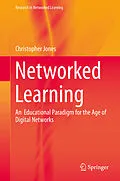This single-authored volume presents technical, academic, and societal context for networked learning across educational settings. It lays the necessary groundwork by differentiating networked learning from related concepts such as e-learning and technology-enhanced learning, and situating technological progress within the larger context of social change. From there, the most salient questions relating to infrastructures and institutions are analyzed, including challenges for the university, the role of affordance in digital educational design, whether networked learning has (or needs) its own pedagogy, and the wider political implications of networked learning. This synthesis transforms a wide-ranging and seemingly scattered multidisciplinary field into a cohesive, accessible, and operable whole.
Featured among the topics:
· Theories of learning in a digital age.
· The significance of networked theories for networked learning.
· Openness, open educational resources, and the university.
· Cloud computing and hybrid infrastructures.
· Pedagogy and the scholarship of teaching and learning.
· Relationships between technology use in society and in education.
Given its balance of theoretical and practical information and present-day and future-based insights, Networked Learning has considerable value for education researchers, educational technology researchers, teachers, policymakers, and students.
Autorentext
Dr. Jones is a Full Professor of Research in Educational Technology at Liverpool John Moores University. He leads the research group of the same name (R-Ed.Tech) in the Centre for Educational Research and Evaluation Services (CERES) at LJMU's IM Marsh campus. Dr. Jones' main contributions to research have been in the development of Networked Learning as a research area. He is one of the organizers of the successful international Networked Learning conference series held bi-annually and he has edited two volumes, published in 2002 and 2009, setting out a developing research agenda for Networked Learning and bringing together researchers from the UK and abroad. Dr. Jones' work is focused on the relationship between technological artefacts and social order and the ways in which policy affects practice. He has published journal articles and book chapters about the application of the metaphor of networks, infrastructure and the 'meso' level of analysis to the understanding of networked learning.
Zusammenfassung
This book posits the idea that networked learning is the one new paradigm in learning theory that has resulted from the introduction of digital and networked technologies. It sets out, in a single volume, a critical review of the main ideas and then articulates the case for adopting a networked learning perspective in a variety of educational settings. This book fills a gap in the literature on networked learning. Although there are several edited volumes in the field there is no other monograph makes the academic case and provides the academic context for networked learning. This volume accomplishes three main goals. First, it assists researchers and practitioners in acquainting themselves with the field. Second, it provides resources for reference and guidance to those not well acquainted with the field. Finally and most powerfully, it also allows for the consolidation of a field that is truly multidisciplinary in a way that maintains coherence and consistency.
Inhalt
Technology, learning and social life.- The age of digital networks.- Theories of learning in a digital age.- A network of learning theories.- An ecology of actors and actants in digital networks.- The institutions: the university.- The infrastructures.- The academic.- The Learner.- The future of networked learning.
